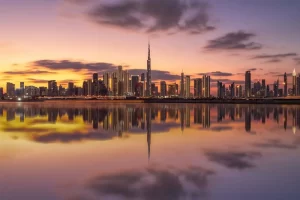Nothing in the UAE happens by accident. The government is known for its long-term visions and initiatives, and the population growth we see today can largely be attributed to a well-engineered collection of policies and investment incentives designed to attract and retain talent.
This approach is working. The most up-to-date survey from Worldometer puts the UAE population at 11,359,575, based on data from the UN. By 2050, this number is projected to reach close to 16 million. It’s also worth noting that the UAE currently ranks first globally in the Global Entrepreneurship Monitor 2024–2025, so it’s no surprise that much of the population growth is coming from entrepreneurs, investors, and business leaders seeking to establish themselves in the UAE.
This influx has been facilitated by a number of immigration routes, including golden visas, as well as five and ten-year residency visas. Meanwhile, the enduring appeal of the country’s free zones, catering to a diverse range of industries, continues to position the UAE as one of the most forward-thinking and business-friendly environments in the world.
Outside of population growth attributable to expatriates, the UAE government is also supporting Emiratis through incentives such as financial allowances and housing benefits aimed at encouraging childbirth and marriage. There has also been a growing emphasis on promoting flexible work arrangements and childcare support.
This article examines the UAE’s population growth, its implications for the future of work, the industries most affected, and how the Emirates is expanding while other notable business centres, such as Japan, South Korea, and parts of Europe, are experiencing a population decline.
Why population growth matters for business
What does population growth actually mean for business in real terms? At its core, it’s an engine for economic expansion. It doesn’t take a mathematical genius to work out that more people means more demand. Demand for what? For housing, food, services, capital circulation, and so on.
But infrastructure is at the centre of this. You only need to look at the skyline. And it’s also visible in Dubai’s Urban Master Plan 2040, which, in part, is aiming to redesign the city to accommodate the influx of new people – that means new residential areas, business hubs, green spaces, and transport systems.
How population growth has changed the nature of work
The growing number of people coming to the UAE has affected how people work. Employers are responding to this need to attract and retain talent by moving away from fixed compensation models and adopting pay structures that are based more on performance. This then aligns employee rewards with both individual and organisational achievements.
What is the impact of this in real terms? Performance-based compensation enables better cost control by reducing fixed labour expenses while still offering competitive total compensation to top performers. It also allows for better differentiation between talent, so high achievers can be rewarded significantly above market rates, while organisations are able to manage costs for average contributors.
Yes, a lot of talent is flooding into the country, but retention remains a central concern for employers and HR departments. It is vital to keep critical talent, and this is now being achieved through a variety of incentive programs that encourage high performers to stay, and in turn reduce turnover and keep important institutional knowledge within the organisation.
How population growth will change opportunities by industry
The UAE’s population growth is going to impact every industry, but certain areas will see a more significant change. Let’s break down what this means for several key sectors:
- Real estate and construction: Always a major sector for the UAE, population growth will only increase the demand for housing, offices, logistics centres, and retail spaces. Developers are committing to building massive new communities, in line with the government’s visions and initiatives. Beyond the size of the projects, the focus is increasingly on creating smart communities. For investors and builders, this represents a generational opportunity in both construction and several related fields, including architecture, interior design, property management, financial services, and legal services.
- Healthcare: The larger population means more demand for healthcare services. To that end, the UAE is investing in both private and public hospital expansion, as well as preventive care, telemedicine, and wellness tourism. Entrepreneurs in biotech, pharmaceuticals, diagnostics, and digital health will find a growing market with strong government support for this key sector.
- Education: More families and professionals settling long-term means greater demand for private schools based on international standards, as well as vocational training and higher education. Investors in edtech, language learning, and professional upskilling will find growing opportunities.
- Retail and consumer services: Dubai and Abu Dhabi are already retail powerhouses, but with population growth comes the next wave of hyper-personalised, tech-enhanced consumer experiences. This is likely to lead to significant growth in e-commerce, fintech, delivery services, food and beverage, as well as entertainment.
- Technology and AI: With a young and highly skilled population, the UAE is an ideal testbed for AI, blockchain, robotics, and clean technology. With initiatives such as Dubai’s Metaverse Strategy and the National AI Strategy 2031, the country is laying the groundwork to become a leader in future-focused industries.
How the UAE is planning for 2040 and beyond
The UAE is always focused on the future: UAE Centennial 2071, We the UAE 2031, Dubai Plan 2040, Abu Dhabi Economic Vision 2030 – they all reference population growth in some way, even if it’s implicit through initiatives that will support the growing number of people moving to the UAE, as well as Emirati families expanding.
These plans are about growth, but they’re also very much about shaping a future that balances opportunity with liveability. So it’s not about uncontrolled growth, but creating sustainable urban development that includes increasing green and recreational spaces, doubling public beach areas, expanding urban centres to ease congestion, and promoting walkability and sustainability throughout the city.
The future of the UAE’s population and economic growth
Few growing countries around the world can match the UAE’s unique combination of safety, infrastructure, government support, and high quality of life. Think of it this way: If you buy property in 2025, it could be worth double by 2035; a startup launched today could grow into a major brand serving a large population; or a small healthcare provider could scale up to serve hundreds of thousands of new residents.
Population and economic growth here are not abstract trends but are living realities backed by strategy, infrastructure, and vision. The next 20 years will define the future of business in the UAE, and those who take action today have a chance to become tomorrow’s success story.


